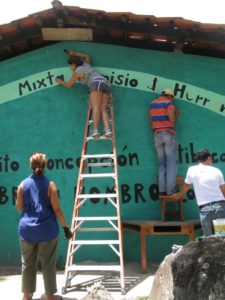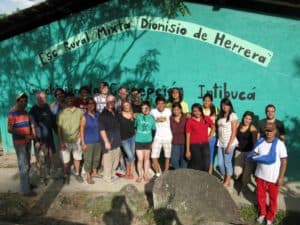Health promoters form the backbone of our public health mission in the frontera. Each day, they travel by truck, moto, and foot into the rural Intibucá communities. Shoulder to Shoulder em- ploys a staff of 24 promoters, who reach each of our five municipalities every week.
Promoters perform nearly every service under the public health sun: providing health and nutri- tion education, human and animal vaccinations, water sampling, data gathering, and identification of high risk or needy members of the community. Their success rates are worthy of study. As a sim- ple example, promoters began vaccinating dogs for rabies five years ago. Each year, they identify and vaccinate every dog in the municipality. If you are familiar with the dogs of Intibucá, you know this is no small feat. Since the promoters began rabies
vaccinations, there has not been a single reported dog-related rabies case in our service area.
As members of our EAP teams, they develop relationships with individuals in the community and bring our doctors and nurses to inaccessible families.
In January and February 2013, promoters vis- ited 422 homes, took height and weight meas- urements of every child under two in targeted municipalities, engaged in community nutrition and health talks, and monitored the health of countless pregnant women, new babies, and high- risk individuals. Promoters are invaluable to our mission. Their work saves lives and improves the health of the members of our community.
"Part of their world"
This is a song written by one of the Dayton brigade members:
To Disney’s “Part of Your World”
21 July 2012, Dayton Ohio HS Brigade
Look at our lives; aren’t they neat?
(But) Somehow or other they’re not quite complete
Looking around here you’d say,
Sure, we’ve got everything
We’ve got muy cool hair gel a-plenty
And high tech track sneakers galore
Cavity-free teeth? More than twenty!
But who cares? No big deal… we want more
We wanna go where the people know
Know how to smile when they’ve got next to nothing
Loving their fútbol played barefoot
On hard-scrabble ground
We need to share what we have in life
Crayons, papers, pencils, puzzles…
(with) kids who walk 5 miles to school each day
on uphill ground
This is our chance
Chance to give back
Some of the things that we have that they lack
It only makes sense, Dad
We’re just not that dense, Dad
We’re part of their world
What would it take to give them a break
Just next to nothing
When push comes to shove, we get more love
Than we could ever hope to be given
Yes we’re knowin’
That we’re growin’
We understand
We’re part of their world
Dayton High School: Guachi (July 13-23)
Dayton high school had a great time on their very first brigade in Guachi. Even though they weren’t a traditional medical brigade, they had just as big of an impact working. They spent their mornings playing with the kids in both the grade school and the kindergarten and giving presentations about self-esteem and dental care. They brought down materials for arts and crafts and different teaching tools for the teachers. In the afternoon they worked hard painting both schools and playing soccer out front with kids from the community. By the end of the week they still had enough energy for a dinner with some of the local families and a talent show. Their energy shined through even on the rainiest of days as they all got together and had a makeshift mudslide in the lawn of the clinic. It was so great to see a young group of people so invested in the community and willing to try just about anything. We are looking forward to having them back again!




